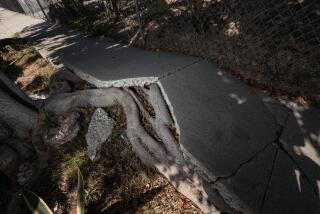Clean up before someone is hurt
- Share via
Question: Our homeowner association claims that common areas that border an owner’s property belong to the titleholder and are not the association’s responsibility. Since several homes have gone into foreclosure, sidewalks in front of these areas have become cluttered with twigs and other debris that has piled up. If someone falls on these sidewalks, could the association be held liable? If so, would this risk give the association the right to clean up these areas?
Answer: Your association’s governing documents, including the covenants, conditions and restrictions -- or CC&Rs; -- should define what property belongs to the titleholders and what belongs to the association. Each situation is unique, but under Alpert vs. Villa Romano Homeowner Assn., California courts can hold a homeowner association liable for trip-and-fall accidents on city-owned sidewalks adjacent to the common interest development, including individual homes, if the sidewalks are maintained by the association. In the Alpert case, the hidden root of a tree planted on common-interest development property damaged the city sidewalk in front of the property, and someone tripped and fell on the raised concrete. Although the association argued that it was not liable for accidents on the city sidewalk, a court held that because the association maintained the property, it had a duty to warn of a dangerous condition. On retrial, the association was found liable and was ordered to pay damages to the injured party.
The court said, “The existence of a duty of care is a matter of law and the foreseeability of a particular plaintiff’s injury is a question of fact.” It held that a landowner or possessor of land has a duty to take reasonable measures to protect people from dangerous conditions on adjoining land when the landowner exercises possession or control over that adjacent land. The court also held that the standard -- to be applied in a premises liability action in determining if that duty has been met -- is whether the property owner acted as a reasonable person in managing the property in view of the probability of injury to others.
Because foreclosure creates still other issues about ownership and legal obligations, it may very well require a court decision or arbiter to determine the precise circumstances pertaining to your association. If it turns out the owner is obligated to clean up and refuses to do so, the association may be able to bill the titleholder or potential homeowner for the costs involved. In certain situations, if the property is sold and there is a lien in place at time of sale, that lien might be paid through the purchaser’s escrow.
In light of the Alpert case, any area “cluttered with twigs and other debris” might arguably be deemed foreseeable to causing injury to others. As the case points out, where the association is responsible for maintaining the area, the association may be held liable. Waiting until someone is injured before taking action is foolish and could be a costly decision.
--
Send questions to P.O. Box 11843, Marina del Rey, CA 90295 or e-mail [email protected].
More to Read
Inside the business of entertainment
The Wide Shot brings you news, analysis and insights on everything from streaming wars to production — and what it all means for the future.
You may occasionally receive promotional content from the Los Angeles Times.










